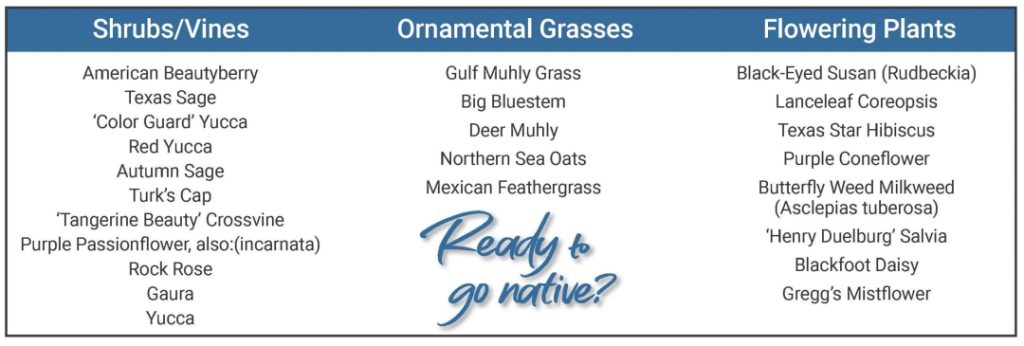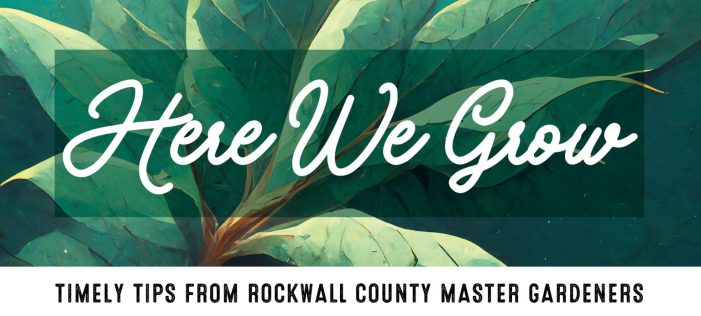Rockwall County, TX (September 24, 2024) – “Go native” has a variety of meanings. The Merriam-Webster.com dictionary defines this idiom as “to start to behave or live like the local people.” “Go native” in the context of landscaping translates to using native plants. The US Department of Agriculture holds that native plants are part of ecosystems that have developed in a particular geographic region over hundreds or thousands of years. Thus native plants are well suited to the soil, moisture, temperature, and pests of the region. “Go native” with people means introducing new comers to our communities. “Go native” with plants means re-introducing native plants to our landscapes.

Rockwall County is part of the Blackland Prairie EcoRegion of Texas. This region is true prairie grassland, naturally dominated by perennial and annual grasses and a diverse assortment of trees, shrubs, annual and perennial flowering plants. Texas Parks and Wildlife writes that our soil is considered some of the richest soil in the world! Yes, “native plants” have adapted to our rich soil over hundreds of years.

The National Wildlife Federation and The Audubon Society are two of many non-horticultural organizations that promote “going native” when speaking of preferred planting options. The Audubon Society notes that “native plants can help create a healthier environment, a healthier ecosystem, and support higher diversity of animals.” Research has found that native oaks can host over 550 different species of moths or butterflies throughout their life cycle. However, a non-native tree, such as a gingko, can only host 5 different species. The butterfly bush is a favorite non-native plant recently introduced to our landscapes. They are beautiful and attract butterflies, providing nectar for the mature butterfly. However they do not offer nourishment or desirable environment in any of the first three stages of butterflies’ life cycle. Conversely, a Blackland Prairie native plant, milkweed (i.e. Asclepias tuberosa variety), is beautiful, attracts butterflies, provides nourishment and desirable environment throughout the butterfly’s life.
While supporting a healthier ecosystem, specific benefits of landscaping with native plants include:
- Improve soil, help manage rain water runoff and erosion due to deep root systems
- Reduce need for supplemental watering once established
- Reduce need for herbicides, insecticides, and high-nitrogen fertilizers
- Preserve endangered plants from extinction
- Help prevent introduction of invasive species
- Provide a sense of place, preserving the natural heritage
- Provide beautiful spaces
October in North Texas is the best time to “go native” in your landscape, whether planting trees, ornamental grasses, shrubs or flowering plants. Planting in October will give the root systems a good start before winter sets in. The plants will be ready to thrive once spring arrives and to survive the summer heat.
Planting even a 2 foot x 2 foot patch of your landscape with native plants can yield many positive results. Some gardeners have “gone native” with the strips of yard between the sidewalk and the street with remarkable success. Or consider “going native” in that sunny corner of your yard that may seem too hot or too dry.
Ready to “go native?” The lists here include native shrubs, vines, ornamental grasses and flowering plants that can strengthen our ecosystem while adding variety, color and beauty to your landscape. Find out more about these and other plants native to our area using these links: ekps.tamu.edu/ and aggie-hort.tamu.edu/ornamentals/nativeshrubs/indexcommon.htm
Find out more about these and other plants native to our area using these links: ekps.tamu.edu/ and aggie-hort.tamu.edu/ornamentals/nativeshrubs/indexcommon.htm
There is so much to discover with Rockwall County Master Gardeners at txmg.org/rockwall/. Browse a variety of favorite Texas natives in our 2024 Fall Plant Sale, now through Oct. 5. The plant sale features native perennials, vibrant winter annuals, ground covers, grasses and “made for shade” plant selections. Plus, our newly-curated seed collections for herb gardens that attract swallowtails, cut-flower gardens and Texas wildflower seed.
Stop by “Lessons from the Garden” on Saturday, Sept. 28 at Rockwall County Historical Foundation Museum, 901 E. Washington, from 10 a.m. to 2 p.m. It’s a fun, free, come & go event featuring what to plant now, how to build a rain barrel, tree talk, plant propagation and seed harvesting stations. Explore the cotton patch and learn about the Blackland Prairie Preservation Project, Museum information and tours, Plant Giveaways and Kids Activities –– plus a special performance by Greater Rockwall Youth Symphony.
By Virginia Davis, Rockwall County Extension Master Gardener. Rockwall County Extension Master Gardener Association is a 501c3 with a mission to provide research-based horticultural education and advice across Rockwall County.






